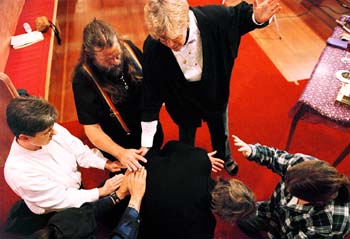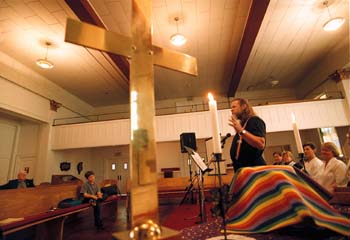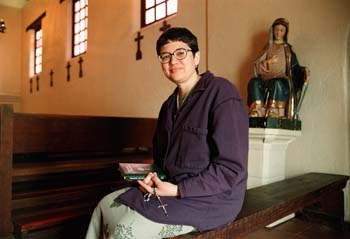![[MetroActive News&Issues]](/gifs/news468.gif)
[ Santa Cruz | MetroActive Central | Archives ]
Cross Purposes
Handle With Care: Parishioners and pastors of Metropolitan Community Church gather around to pray for one of their members who has been 'slain in the Spirit.'
Where do you go when you love Jesus as well as your own gender? Revelations from the front lines of gay Christian soldiers and the churches that minister to them
By Kelly Luker
LIGHT FILTERS through the stained-glass cross in the window, framing Rev. Jean Hart as she speaks of God's unconditional love. It bathes the choir as their voices reach to every corner of the church. The multihued light reflects off a parishioner as she sinks to the floor, "slain by the Spirit," as it is called. Associate pastor Rev. John Phillips continues to pray, speaking in tongues as his outstretched hands hover over the fallen woman.
One parishioner after another falls backward and is guided gently to the floor. The Spirit is quickening, Rev. Hart will tell you, moving from one bruised heart to another. Although physical aches and illnesses are a problem, many of the parishioners here have soul-deep wounds as well that hunger for the healing this charismatic service promises.
These are gay and lesbians, but they do not need or want healing for their sexual orientation. Instead, they are reaching out for a power that can heal damages left by a Christian-dominated society that has cast them out as "abominations." Ironically, the only power strong enough to do the job, these men and women are convinced, is Christ Himself.
Lord knows, organized religion and homosexuality make for strange bedfellows. But sometimes, there's nowhere else for spirit-hungry gays and lesbians to turn than the church next door. And slowly, every so slowly, those big oak doors are creaking open in response.
Where Rev. Hart holds sway on Sunday nights may not be exactly like the church next door. Not that charismatic healing, speaking in tongues and witnessing to miracles are that unusual, particularly in fundamentalist sects. But this is Lavender Road, the Santa Cruz branch of the Universal Fellowship of Metropolitan Community Churches, a worldwide denomination begun in 1968 to give gay and lesbian Christians a safe haven in which to worship.
"It was a place for gays and lesbians to go until the mainstream churches got it together," explains Lavender Road's pastor, Rev. Hart, yoked with a thin gold chain and a cross emblazoned in the center with an upside-down pink triangle.
But it's been 30 years, and the mainstream churches still haven't gotten it together, which raises the question: why would gays and lesbians want to be part of a religion that appears to want to have nothing to do with them? It's an interesting juxtaposition, considering that the fellow the religion was named after spent most of his time hanging with the outcasts and oppressed.
It's a paradox that men and women like John Phillips, David Harvey, Ross Parlette and Joanne James don't quite understand themselves. But each has been tapped by the Holy Spirit and, against all odds, found a home with some of the most conservative practices in Christianity.
A guide to finding kindred souls.
A local 'ex-gay' movement promises to help 'heal' Christians of homosexuality.
Cross to Bear
'IT'S TOUGH," says Phillips of Lavender Road. "You go to a church, and you really like the people, but you know you can't come out, and inevitably the pastor condemns people just like you. Then the gay community condemns you for being a traitor if you're Christian."
Phillips is describing not just the struggles of others but his own faltering steps toward Lavender Road. A self-described "effeminate" child, Phillips was the after-school punching bag for his schoolmates in Georgia, where he grew up. After one time too many, the young boy rode his bicycle into the woods and begged Jesus to take him away: he no longer wanted to live. He's not sure what happened next--a vision, a visitation, who knows?--but Phillips recognized it for what it was: "a massive born-again experience."
Phillips couldn't shake the Spirit, and as he grew older he took to witnessing. When he was in his 20s, he hoisted a 12-by-6-foot wooden cross on his back and walked from Atlanta to San Antonio, where he was ordained a pastor with the fundamentalist Calvary Chapel sect.
Phillips always knew he liked men, not women, and when he finally broke the news to his church, he was shown the door. During the next couple of decades, he scoured the scrolls of Eastern religions and sweated in the sacred lodges of Native Americans, but he says, "Christianity was always my home."
The one-time Calvary pastor finally came home to his original faith this January, after attending Metropolitan Community Church sporadically for years. The occasion was a particularly powerful charismatic service that healed Phillips of a crippling illness that had left him virtually bedridden for years. Phillips now assists Hart in offering Communion, healing, blessing and praying with his parishioners.
"Some of the most devout Christians I've met in my life are gay," observes Phillips, a big, burly man with rainbow suspenders. "God is much bigger than any religion."
Indeed God is, for those who cotton to some form of Higher Intelligence. And certainly bigger than most religions--be they Eastern, Middle Eastern, European or Native American--that have at one time or another practiced genocide, torture or sacrifice in order to please their particular Big Kahuna.
Then there's Christianity, the religion postmoderns love to hate. No one doubts that a fair number of Christians have been busy for the last couple of millennia mangling the founder's basic premise. Nowhere has it been more evident lately than in the hate-filled viciousness of the religious right and its pulpit-bullies like Jerry Falwell and Pat Robertson.
But for all its baggage, followers will tell you that Christianity slakes an inexplicable thirst. Although His churches are still trying to get the hang of it, Jesus seems to be relatively unruffled by the gender, race or sexual orientation of those who are bellying up to the bar for a taste of that Living Water, as He called it.
But it's no fun drinking alone. Metropolitan Community Church is the most visible place of community worship for Christian gays and lesbians, but almost every mainline denomination has developed official--and sometimes unofficial--organizations that are attempting to reach out to them. The Catholic Church offers an organization called Dignity. Lutherans have Lutherans Concerned, and Presbyterians have Inner Light.
Louie Crew is the founder of Integrity, the Episcopal Church's outreach to gays and lesbians. An associate professor of English at New Jersey's Rutgers University who has written extensively about gays and theology, Crew also holds a doctorate of divinity. Crew understands the age-old need for ritual that drives people--gay or straight--to seek out others for community worship.
"Mystery," Crew explains. "One of the ways we deal with mystery is to ritualize it."
Married to his partner, Ernest, since 1974, Crew is no stranger to the dilemma of out and proud gays who are deeply involved in the church. "I believe that God is using gay and lesbian people the same way he has used others in the past," Crew says. "To love the world."
Conversion Aversion
JOANNE JAMES grew up in upstate New York with a grandmother whose life was shaped by visions of the Virgin Mary. James left the church as a disillusioned teen, convinced that the Catholic religion consisted merely of a bunch of archaic rules. In the ensuing years, she came out as a lesbian and searched for spiritual practices from Hinduism to Buddhism that would sustain her.
"But the more I practiced meditation," James recalls, "the more the forms of Christ and Mary would appear." The turning point for the spiritual seeker was cancer. James had lost her home in the Loma Prieta earthquake, then her health to cancer, which robbed James of her career as a nurse. It was after radiation treatment one day that James recalls looking at the rosary beads handed down from her grandmother.
"[They] seemed so alive," James says. She began to think of her baptism, when she was given to the care of the church. "They never said they would take it away if I didn't marry a man."
James began attending Holy Cross Catholic Church, which has one of the largest gay and lesbian outreach ministries among Catholic churches on the central coast. Residents from Monterey and Carmel will drive up for the Outreach potlucks on the third Sunday of the month or for the prayer service for gays and lesbians on the first Sunday of the month.
"If we were to continue to call ourselves Christians, we needed to be inclusive," says Kathy Jarosz, a former San Francisco AIDS chaplain who began Holy Cross Outreach Ministries. "We believe we are incomplete without the gay and lesbian community. Holy Cross is about being there pastorally, to heal and empower people."
That phrase "heal," particularly around gays and lesbians, is a red flag. Conservative churches have launched numerous "ex-gay" programs in the past couple of decades that are designed to "cure" gays and lesbians of their orientation.
"Most churches in the area will welcome you if you're gay and lesbian," one gay Christian says. "But then they want to 'rehabilitate' you of it."
In fact, the Vatican took an official position in 1986 that homosexuality was an orientation, not a chosen lifestyle. However, it still left gays in limbo by refusing to recognize same-sex marriage while condemning sex outside of marriage.
The struggle between what the pope says and what her conscience decrees still remains with James. But it has not prevented her from pursuing some of the most conservative elements of Catholicism. She does devotional chanting. She also leads a Rosary group, ticking off the Our Fathers and Hail Marys with others lost in deep prayer and reflection.
Asked which is harder for her--being "out" as gay or being "out" as a Christian--James chuckles. "It's much easier to say I'm a lesbian than a Christian in Santa Cruz," James admits. "There's so much hypocrisy in the church and that's what [gays] focus on."
James believes that it often takes something "compelling" to bring gays and lesbians back to the church of their childhood. "For me, it was such a sense of loss, so much was taken away," she explains. "I looked for what could last."
The Triangle and the Cross: Joanne James believes that honoring her sexual orientation is part of being a devout Catholic.
Holy Water
'THIS IS THE DAY the Lord has made!" shouts Pastor David Harvey from behind his electric organ. Cries of "hallelujah" and "praise Jesus" greet him in response. Within moments, his congregation of about 30 or 40 are on their feet, palms turned upward in praise. The industrial carpet is worn and the ceiling tiles are stained with age, but no matter--this nondescript conference room vibrates with faith enough to light up the Sistine Chapel.
This is Celebration of Faith, a Pentecostal service that electrifies with its infectious joy and love. But there are clues that Celebration of Faith may not be like the Pentecostal churches of the deep South that shaped Robert Duvall's character in The Apostle.
While praise and upbeat music, Bible-thumping and talking in tongues are part and parcel to the service, so is the reminder from the pulpit about finalizing plans for the annual Gay Pride parade. And this service is held in the Billy DeFrank Community Center, San Jose's gay and lesbian center.
Harvey's parish may be one of the few gay/lesbian/transgendered Pentecostal parishes in existence. "We're a minority within a minority," Harvey laughs, which he does a lot. During the service, he is moved to tears by a testimonial of God's healing, but the pastor who was originally ordained with the fundamentalist Assembly of God churches is also funny, camp and flamboyant.
During the announcements, Harvey fills his parishioners in on a recent trip to Las Vegas. There were the fabulous costumes of the "gay boys," as Harvey calls Siegfried and Roy, who it is rumored recently got a divorce, he heard. Then there was the pirate floor show with all those fabulous wet bodies. A few heartfelt "Amen"s and "Yes, Lord"s punctuate Harvey's travelogue. And Harvey admits he managed to take in a couple of drag shows before flying home.
Hovering somewhere between surreal and sacrilegious, the moment manages to touch down right where it's supposed to--in the heart. Harvey's parishioners adore him, but they know he's just a conduit to the Big Guy.
"We're just Bible-believing people," Harvey tells me. "We celebrate the life Jesus gives us and preach that Jesus is Lord."
Harvey knows that his Sunday service is full of gays and lesbians who have been thrown out by their own church, sometimes physically. Like Harvey, most come from Pentecostal backgrounds.
"I have a lot of people with a lot of baggage that I have to work with," the pastor admits. "I stress that if God knew you in your mother's womb and you're gay, why are you trying to question what you are?"
But Harvey had to leave the Assembly of God churches in 1986 to do his own questioning, to explore being gay and Christian before it destroyed him. Then he started asking God what to do about it.
"God told me to establish something for the gays and lesbians," Harvey says of the spiritual awakening that came as an answer, and so Celebration of Faith was born.
This morning, several parishioners stand and give testimony. Dolores Dickerson, who was born male, testifies to her various afflictions being healed after a laying on of hands. Rick witnesses to the breakthrough in protease inhibitors, which has allowed his AIDS-impacted immune system to partially recover.
"God hears our prayers," Rick says. "And God answers all."
Then Celebration of Faith's treasurer, Ross Parlette, passes the collection plate. Tall, with graying hair and wearing a business suit and tie, Parlette looks like a distinguished deacon in a small-town Baptist church. Which he was at one time.
He left the Baptist church in 1969 after coming out. Within two weeks he was attending San Francisco's Metropolitan Community Church. But Parlette hungered for a more traditional church.
"I'm a religious conservative," explains the retired computer programmer. And San Francisco's MCC was "not a hotbed of biblical teaching," he adds dryly. Parlette cottons to the traditional practice of Christianity--no guitars, no New Age philosophy.
"Besides being gay," Parlette likes to joke, "I'm pretty straight."
And Justice for All
ALTHOUGH THE CHASM between gays and organized religion seems impossibly vast, Vaughn Beckman sees signs of hope. Beckman is the executive director for the Santa Clara Council of Churches, a network of 100 churches in Silicon Valley committed to social justice. A graduate of Jerry Falwell's Liberty University in Lynchburg, Va., Beckman left his role as education minister of a San Jose Baptist church in 1989 in order to take a hard look at his sexuality and theology.
Now openly gay, Beckman has gathered a list of 50 churches in the Santa Clara region that are open and affirming to gays and lesbians. Out of 800 churches, that is still a mere drop in the bucket, but he believes it is a start.
Beckman also taught a class at the DeFrank Center on the Bible and homosexuality, which he says was one of the largest attended classes in the history of the center. He also notes that one of the bestselling books in gay bookstores is What the Bible Really Says About Homosexuality, by Daniel A. Helminiak.
Perhaps those latter two are merely indications that gays and lesbians want to learn how to fight fire with brimstone. But Beckman has faith that change--although it moves glacially--is on the horizon.
"I don't think this is unlike other social justice issues," says Beckman. "Churches tend to be the last to deal with those kinds of issues." He points to the churches' stance on slavery, racial issues and women's rights.
It's not easy tuning into the original message of unconditional love beneath the hate-mongering rhetoric or waffling by conservative and traditional denominations. But folks like Joanne James, David Harvey and Beckman figure the only way to claim their piece of the cross is to pull up a front-row pew.
"I love the Mystery," says James. "I feel like the struggles only make it a deeper spiritual path for me."
[ Santa Cruz | MetroActive Central | Archives ]
Copyright © Metro Publishing Inc. Maintained by Boulevards New Media.
![]()

Dai Sugano![[line]](/gifs/line.gif)
![[line]](/gifs/line.gif)

Freedom to Worship: Metropolitan Community Church assistant pastor the Rev. John Phillips tells parishioner how faith healed his illness.
George Sakkestad
From the June 23-30, 1999 issue of Metro Santa Cruz.